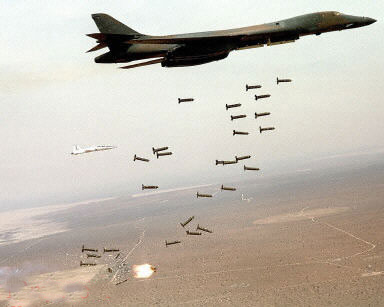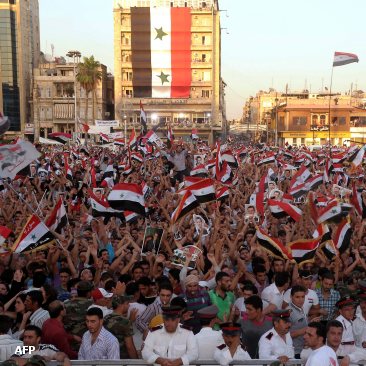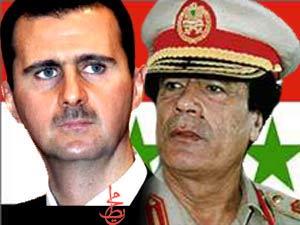Stabilizing the security in Libya and preventing any escalations into a civil war remain at the top of the Western countries especially the European ones, but France in particular.
--Nidal Hamadeh
In a report published ealier on Al-Manar Website in Arabic last June 24** about the political falling dues that would change the course of the Western pressures on Syria, we had details and information about the issue telling that France and Britain had set next September a deadline for ending the military operations in Libya and for finishing the toppling of Colonel Mua'mmar Al-Gaddafi.
Furthermore, the report included additional information all of which was channeled towards the Western inability to proceed in the attack against Syria. In other words, the Syrians do have enough time to deal with their internal crisis without worrying about a NATO military intervention like what happened in Libya, despite the warnings rising from all directions. It was our expectation for a simple reason and that is the Western practical inability of producing any effectual act on the ground. Now, after Tripoli, the West has fallen in the hands of the Libyan rebels just about the beginning of September, the information produced in June report standing with respect to Syria in addition to certain improvement in the situation.
It is contrary to the view saying that toppling Al-Kaddafi will speed up in the collapse of Syria. This is additional to a new reason added to the rest of the reasons, which is the busy West in the coming months with the security situation in Libya and with the division of the Libyan treasures between the U.S.A., Europe, and between the Europeans themselves. Whereas the U.S.A. that declared the victory in Libya through the presence of Jeffry Feltman in Benghazi over the past two weeks will not accept to fail to grab its share from the Libyan oil. On the other side, France considers that it has been over the past six months the international and military spearhead in the war against Gaddafi. For this reason, it has to get its share, too, and no party must think of sharing with it the rebuilding projects of Libya and in extracting and producing oil there. Britain shares France the same view while Italy can see that those countries' stances will be on its account, having been the greatest European investor in Libya.
 Stabilizing the security in Libya and preventing any escalations into a civil war like what happened in Somalia and Iraq remain at the top of the Western countries especially the European ones, but France in particular.
Stabilizing the security in Libya and preventing any escalations into a civil war like what happened in Somalia and Iraq remain at the top of the Western countries especially the European ones, but France in particular.
This is going to take additional a long time, security and military effort particularly if the French expectations come true as Algeria is striving to make Libya a racial state so that it could prevent France and the NATO from a permanent stay at its borders the act that will jeopardize its present regime.
On this topic in specific, and according to French informed sources recently visited Beirut, the Algerian apprehensions about France have their justifications based on information leaked related to the Algerian and its stance. On the side talks between the French president, Nicolai Sarkozy and the Chairman of the Transitional Council in Libya (Mustafa Abdel Jalil), the French President remarks to his Libyan discussant, "Algeria is going to be our next target in a year from now." By time calculations, it would mean after the French coming elections in May 2012 that Sarkozy is striving to win for a second presidential term.
The French sources added that Algeria has become a surrounded country after the changes in Tunisia and Libya, and after the Monarch of Morocco has succeeded in passing the reformations without any internal complications in addition to his relishing a continuous Western support. Such a strategic and geographical situation has been the main reason behind the military support Al-Gaddafi has received throughout the war period from the Algerian government and the junta ruling Algeria.
 The sources say that on the French side there is dread that Algeria strives to balkanize Libya by opening up its borders for Al-Qaeda and the extremist organizations toward Libya in order to fight against the blasphemous colonist like what Syria had done after the collapse of Baghdad under the strikes of the U.S.A. army in 2003.
The sources say that on the French side there is dread that Algeria strives to balkanize Libya by opening up its borders for Al-Qaeda and the extremist organizations toward Libya in order to fight against the blasphemous colonist like what Syria had done after the collapse of Baghdad under the strikes of the U.S.A. army in 2003.
In the Syrian situation, the Western falling dues in the above-mentioned report remain standing besides salient points of French weaknesses despite the high pitch used by the French President and the Minister of Foreign Affairs (Alain Juppe). However, president Sarkozy's declaration of withdrawing French forces from Lebanon provided that the forces encounter another operation after the one that had targeted them on last July 28 uncovers the limits of the French ability of forbearance. Sarkozy the man striving for his re-election wants zero human losses in Afghanistan and in Lebanon; on the other hand, the French miserable economic conditions that forced the government to cut down the expenses and to raise the taxes in order to reach an increase in the gross national income with (15 billion Euros).
Those two reasons besides the previously mentioned facts will make the West in its entirety unable to intervene militarily in Syria and will make September an organic point for a decline in the real danger of Western intervention. However, the acute pitch in the announcements similar to the way it is now is not going to be of benefit and is not going to scare the Syrian leadership not whatsoever!
The West has fought an easy war in Libya against a regime holding onto nothing to use pressure. In addition, this regime had already handed over its weapons to the West 10 years ago. Nonetheless, the situation in Syria is drastically different, and this is what makes the Western military intervention rather a theory with no chance for application in the Sham Region.
_________________________________________
** The above mentioned report talked about the Turkish and Qatari plan to exert pressure on Syria to return Saad Hariri as a Lebanese Prime Minister. This plan had been failed due to Hezbollah Secretary General Sayyed Hasan Nasrallah’s refusal.
France also had its own plan against Syria, where Sarkozi tried to gain more popularity amongst his people in order to win the next presidential elections, in addition to the bribes granted by Qatar to France.
To read the article in its Arabic version, click here.
